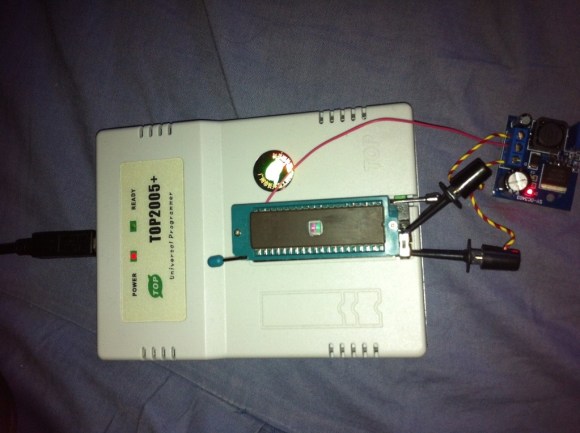
[Morten Overgaard Hansen] has a cheap EPROM programmer which he uses to program chips for retro gaming (among other things). He was surprised that although the device includes a 40-pin ZIF socket it seems to lack the ability to program 16-bit chips. He figured he could get it to play ball if he put in a little effort. Above you can see that a few add-on parts enabled 16-bit programming on the device.
If you look inside the case you may be surprised to find it uses an FPGA. [Morten] searched around and found a few others online who had been looking to stretch the functionality of these types of programmer. Specifically, he came across a Python program for this programmer’s bigger bother that already implemented the functions necessary to program the larger chips. He used it as a guide when writing his own programming application.
On the hardware side of things he needed to feed a higher voltage to the VCC pin, which is done with the boost converter seen to the right. He also added some jumper wires to manage the output enable signal. To make the whole thing modular he ordered a ZIF socket with long pins and soldered the alterations in place. Look closely and you’ll see two levers for ZIF sockets. The one on the right is for the original socket, the one on the left is for the adapter.















Those TOP programmers are rubbish, I had to send mine back, and I’m building my own with an Arduino now.
I’d like to see a write-up on that when you get finished. Don’t forget to submit a tip.
hm … interesting
never seen anyone try to improve an FPGA/ARM design with an arduino before XP
I got a top85 programmer. It is nice when it works. Only problem is the drivers are only 32 bit not 64.
Sometimes times the drives like to crash when run in a virtual machine I found out after crashing my usb hub then when the hub restarts virtual box will take ownership of everything usb I plug in. thus no keyboard or mouse to close virtual box. and your screwed!
Would be nice if there was a better software solution to use with these programers
i have one of these
there AWESOME … IF you use the software of the site not in the disk
runs fine on 64 bit for me and has all my 8 bit chips and proms right there
tho the chip detect sucks …
this is a nice and simple hack but for me its either 8 bit or 32 bit i dont really work in between … and i dont think they make threw hole 32 bit chips XP
Arduino seems to be rather slow for a programmer, particularly for NAND